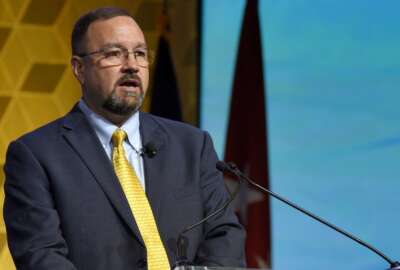

One of the Defense Intelligence Agency’s chief priorities is modernizing JWICS, which agencies governmentwide rely on for top-secret communications. DIA’s J...
The Defense Intelligence Agency is in the midst of upgrading the federal government’s three-decade-old, top-secret network, and a senior DIA official says cloud will play a big role in both modernizing the system and providing a more tightly connected global infrastructure for data sharing.
Johanna “Jojo” Leasiolagi, senior technical advisor for DIA, said delivering on the future architecture of the Joint Worldwide Intelligence Communication System is a major priority in 2023.
During Federal News Network’s DoD Cloud Exchange 2023, Leasiolagi said multi-award cloud contracts like the Defense Department’s Joint Warfighting Cloud Capability (JWCC) and the intelligence community’s Commercial Cloud Enterprise (C2E) will play a major factor in the JWICS modernization.
“We are really working on expanding the highway that will deliver higher capacity and bandwidth to our customers as we enter cloud modernization as well with the delivery of JWCC and the C2E contracts,” Leasiolagi said. “So from both sides in the Intelligence Community and the DoD, customerwide, we’re really looking at being able to deliver higher throughput and better services to our community as a whole.”
The JWICS network has been around since the 1990s. Originally conceived to facilitate video meetings between DIA headquarters and the Pentagon, the network has expanded to handle email and other forms of data. Today, the entire federal government relies upon it for top-secret communications.
And now with more modern digital applications increasingly in demand at DoD and in the IC, JWICS needs higher bandwidth and lower latency.
“As we start in investing in better technology like machine learning and tactical communications, and we start trying to integrate how the battlespace commanders work together with the intelligence community, they need applications that take higher bandwidth and are integrated across the board,” Leasiolagi said.
Defense and intelligence components also have more pressing demands to share data across different systems under concepts like Joint All-Domain Command and Control. Leasiolagi said that’s an area where cloud computing can help DoD and the IC move away from stove-piped systems.
“What the cloud systems allow us to do is to be able move into more smart locations and move those applications that can work faster and better, without having to really worry about having so many different data centers and having to spend so many resources on an aging architecture,” she said. “It really helps us be able to integrate our systems together and work smartly.”
At the same time, cybersecurity remains a chief concern with the move of sensitive data into cloud data centers. For example, in February, the U.S. Special Operations Command confirmed it was investigating a report that it had inadvertently left 3 terabytes of unclassified email data exposed on the internet.
“Just because we’re moving to the cloud does not mean that we no longer have risk, and that it’s on the cloud service providers,” Leasiolagi said. “It’s a partnership here, where they also have a part of the infrastructure that they have to secure, and we also as customers have our responsibilities.”
She added that cloud providers and agencies will have to work together to gain better visibility into what the other is doing across the entire system architecture.
“One of our biggest lessons learned is to ensure that we have a strategy that encompasses end-to-end security, rather than just having to worry about transferring the security and not worrying about it,” Leasiolagi said.
With JWCC and C2E in place, DIA has multiple cloud service providers it can order from across both its defense and intelligence missions. DIA has been working with its program offices to “find efficiencies” and identify the best locations for establishing various cloud access points and services, Leasiolagi said.
The conversations have been around peering, a cloud term used to describe a networking connection between two virtual private clouds, she added.
“We’ve been really working together on understanding, where do we peer? How do we structure those peerings, and which cloud service provider is going to be where,” Leasiolagi said. “That’s been a partnership, especially because we’ve been looking into how do we provide that data closer to the edge? And how do we ensure that the architecture is postured for that efficiency?
“It wouldn’t make sense to have a location where we would peer at one site, and then it causes latency in another continent,” she continued. “So it’s really important for us to strategize on where we peer, where do we put those services. And if we need something closer to the customers, if it’s either a regional center that’s a little smaller or if it’s something more tactical, that we really work on how that infrastructure is going to work together.”
To read or watch other sessions on demand, go to our 2023 DoD Cloud Exchange event page.
Copyright © 2024 Federal News Network. All rights reserved. This website is not intended for users located within the European Economic Area.
Follow @jdoubledayWFED




Senior Technical Advisor, Defense Intelligence Agency

Reporter, Federal News Network

Senior Technical Advisor, Defense Intelligence Agency
Ms. Johanna “Jojo” Leasiolagi is the Service Delivery Branch Chief, within the JWICS Program Management Office, leading the next generation design of the Joint Worldwide Intelligence Communications System (JWICS), the federal government’s Top Secret intelligence network, at the Defense Intelligence Agency (DIA), a key component of the JWICS Modernization effort. Ms. Leasiolagi is responsible for the design, development, and testing of all future JWICS architecture capabilities. In support of the JWICS Program Office’s JWICS modernization effort, she engages with technical leaders across the military services, IC agencies, and other customers to analyze emerging requirements, collaborate on design patterns, and forge a cohesive TS//SCI environment, delivering an integrated and cohesive ecosystem across the DoD and IC. She also serves as a key member of the Engineering Working Group as part of the Intelligence Community Network (ICN) panel.
Prior to being selected to her current position, Jojo served as the Senior Technical Advisor charged with overseeing network engineering efforts for over 8 networks across 300+ sites globally. She also served as an Active duty military member in the Air Force for 14 years, where she provided communication support for the Distributed Common Ground System, for reconnaissance and surveillance missions. During her first assignment, she enabled the first ever “Reaper” flights over Afghanistan, and provided battle space Situational Awareness to UAV and U-2 pilots in support of the Global War on Terrorism campaigns. As a special duty assignment, Jojo served 9 years at the National Reconnaissance Office in various roles leading the daily operations and maintenance for 43 Wide Area Networks globally and providing communications support for over 20 satellite launches and daily Intelligence, Surveillance, and Reconnaissance (ISR) operations.
Ms. Leasiolagi has been recognized multiple times for her outstanding achievements, selfless leadership, and technical prowess. In 2009, Jojo was selected as a 12 Outstanding Airman of the Year and also won the 2E Communications and Information Award in the Airman category for Air Force Space Command. She has been awarded the Joint Service Commendation Medal by the Secretary of Defense, Air Force Commendation Medal, and two Achievement Medals by the US Air Force. She holds a Bachelor’s degree in Information Systems Security, Magna Cum Laude, from American Military University, received a Distinguished Graduate honor from the Airman Leadership School, and earned the Commandant’s Award from the Noncommissioned Officer Academy. She is a fierce advocate for Human Trafficking rescue efforts, Sexual Assault Victims, and Homeless Shelter support. She lives in Vienna, VA with her husband and son.

Reporter, Federal News Network
Justin Doubleday is a defense and cybersecurity reporter for Federal News Network. He previously covered the Pentagon for Inside Defense, where he reported on emerging technologies, cyber and supply chain security. Justin is a 2013 graduate of the University of New Hampshire, where he received his B.A. in English/Journalism.
